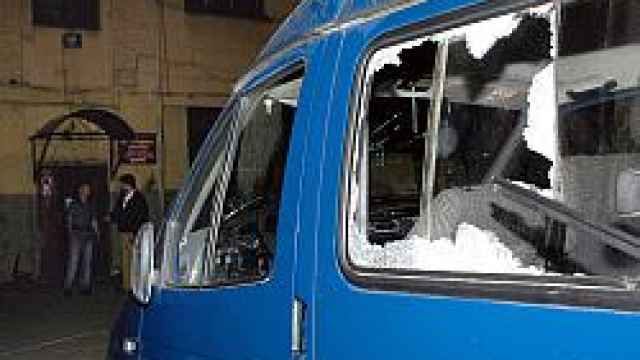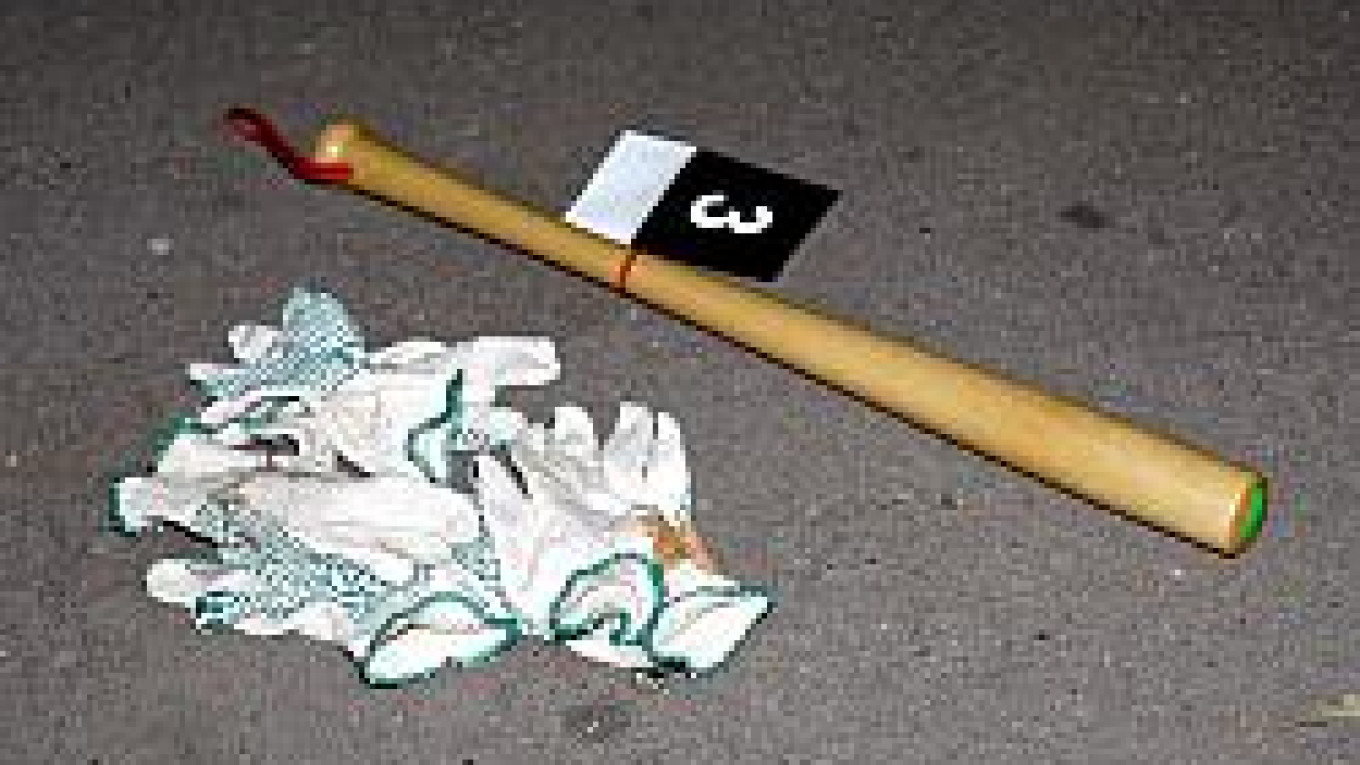The attack, which witnesses said lasted only a few minutes, left three people hospitalized. Opposition youth activists and political leaders accused Nashi of carrying out a well-planned attack against the Kremlin's political opponents and warned of an escalating conflict. Nashi, or Us, which has condemned radical youth groups as "fascists" and proclaimed them to be its primary political foes, denied any connection to the attack.
At around 8 p.m. Monday, members of the NBP, Rodina's youth wing, the Union of Communist Youth and the leftist Red Youth Vanguard, or AKM, finished a planning meeting at the Communist Party's Moscow branch offices at 19 Avtozavodskaya Ulitsa in southern Moscow, people who attended said Tuesday.
A group of NBP activists were the first to leave the building, and they were immediately attacked by up to 30 masked men waiting for them on the street, witnesses said.
Andrei Tolstikov, one of the first NBP members out the door, said he saw the assailants come sprinting around the corner as soon as he stepped outside. Tolstikov said he was shot almost immediately in the chest with a rubber bullet and beaten with baseball bats.
"It was like they knew exactly when we were leaving the building," Tolstikov said by telephone Tuesday.
NBP leader Eduard Limonov warned that it could be the beginning of a "civil war."
At a conference of opposition politicians on Tuesday, Limonov accused Nashi members of being involved in the attack, which he characterized as "a challenge that leaves us no choice. These are the first skirmishes in a civil war, and we have to take part in it."
Limonov added that his followers would be ready to answer with gunfire.
"If they shoot at us, we'll shoot at them," he said. "No one wants it to come to that, but yesterday they were shooting."
At the same conference, Rodina leader Dmitry Rogozin denounced the attacks but was more cautious than Limonov.
"It is impossible to let yesterday's events pass without notice," Rogozin said. "What should we do? Should we also arm ourselves with clubs? If we go that far, we'll be trading elections for broken skulls."
Tolstikov said that the assailants continued beating him with bats and stomping on him after he fell to the ground, after which he lost consciousness for a few minutes. An ambulance arrived about 20 minutes later and took him to the emergency room to treat his head injuries and a broken rib, Tolstikov said.
Sergei Dovgal, one of the leaders of the Union of Communist Youth's Moscow branch, said he was coming downstairs from the fifth floor, where the meeting was held, when he heard shots and screams.
"I looked out the window and saw men in masks beating people on the ground with bats," Dovgal said by telephone Tuesday.
 Itar-Tass A vehicle with broken windows parked outside the Communist Party building. | |
Witnesses said that the assailants tried to escape on a bus that had brought them to the meeting, but traffic police subsequently stopped the bus and took the assailants to the local police precinct for questioning.
NTV showed footage of the bus, which had a sign indicating it was a shuttle service between the Moscow region towns of Korolyov and Balashikha, after it was intercepted outside the Lefortovo Tunnel on the Third Ring Road. The footage showed police on the scene denying cameramen access to the bus, and the men inside were shown covering their faces with their jackets.
It was unclear Tuesday if anyone had been charged in connection with the incident, and city police directed all questions to the City Prosecutor's Office. Calls to the prosecutor's office went unanswered all day Tuesday.
Unidentified police sources quoted in the Russian media, however, gave conflicting accounts of the incident.
Shortly after the incident late Monday, Interfax cited unnamed law enforcement sources as saying the fight was between a group of skinheads and ethnic Azeris, and that a busload of skinheads had been stopped by traffic police in the Lefortovo Tunnel and taken to the police precinct for questioning.
In an interview with NTV aired Tuesday evening, Simonovsky District prosecutor Konstantin Kremnyov said only that investigators would "try to get an explanation and clarify who they are and why they attacked."
A city police source confirmed that a fight had broken out at the time and place indicated by witnesses, though he called the incident "a fight between two groups of 10 to 15 young people," RIA-Novosti reported Tuesday.
Around 20 young people were held for questioning for about three hours at the Danilovsky district police precinct Monday evening and were released after giving statements, the source said, RIA-Novosti reported.
Communist Party deputy leader Ivan Melnikov said he arrived at the Danilovsky precinct after members of the Union of Communist Youth called him and asked him to contact police and prosecutors.
"When I arrived, I went into the office of the precinct chief, who had been joined by the head of the city police's southern district branch and a representative from the City Prosecutor's Office," Melnikov said by telephone Tuesday evening.
"I asked if it was true that there were skinheads involved, and they categorically said 'no.'"
Melnikov said he then asked if they believed members of Nashi were involved, because it appeared to him to be a politically motivated attack.
"They didn't say 'yes,' and they didn't say 'no,'" Melnikov said. "There was just a pause."
Melnikov said police did not allow him to see or speak with the men being questioned.
NBP member Pavel Zherebin, who said he was coming downstairs when his colleagues were attacked, said he and a group of other young opposition activists went to the Danilovsky precinct after the assailants had been detained.
Zherebin said that when the assailants were taken out of the precinct, opposition activists tried to take pictures of them.
"They tried to hide their faces with their coats, and when they pulled their coats up, we could see they were wearing T-shirts underneath with 'Nashi' written on the back in red letters and the Nashi logo," Zherebin said by telephone Tuesday.
Zherebin said the assailants were all well built and in their early 20s.
Limonov said there had been four previous attacks on NBP members this year, and called the latest incident "an escalation."
Nashi spokesman Ivan Mostovich dismissed the accusations that members of his group had been involved, saying that Nashi's activities were "based on the principle of nonviolence."
"Accusations that the Nashi movement beat up NBP and AKM members are completely baseless and are a bumbling attempt to hide internal squabbles," Mostovich said by telephone Tuesday.
Mostovich said that all of Nashi's commissars were currently at a summer camp near Lake Seliger, 160 kilometers northwest of Moscow, and that none of them had been implicated in anything illegal.
Mostovich called the financing of NBP and AKM "criminal" and "clandestine" and said the groups' relationship with their activists, "whom they have to pay to participate in rallies, leads the NBP and AKM leadership into such scandals."
Melnikov said Tuesday that Communist Party leader Gennady Zyuganov had sent telegrams to Interior Minister Rashid Nurgaliyev, Prosecutor General Vladimir Ustinov, Justice Minister Yury Chaika and human rights ombudsman Vladimir Lukin, demanding a thorough investigation of the incident.
Alexander Tarasov, a sociologist specializing in extremist youth groups, said the assailants could have been soccer thugs hired, possibly by Nashi, to carry out an attack.
Such a well-timed attack could have been carried out only with sophisticated planning, including the tapping of phones, Tarasov said. He said he was almost certain that such an attack could not have involved a random skinhead group.
"You need to know exactly where and when and who is there," Tarasov said. "Which organizations have the ability to listen to phones? Only the FSB, and maybe the Interior Ministry. Skinheads don't have access to that kind of equipment."
Tarasov also said the assailants may have worn Nashi T-shirts as a form of political protection.
"If they were brought to the police station and police threatened to charge them on 10 different counts, they could just show their T-shirts and tell them to go to hell," Tarasov said. "They could just threaten to call Nashi leaders, and a small-time policeman doesn't need that kind of trouble."
State Duma Speaker Boris Gryzlov, in Kazan late Monday, said that the attack "was planned in advance, prepared for and carried out in a corresponding manner," Interfax reported. He said it was necessary to find the people "who stand behind these youth, to bring to light the organizers of such a disgraceful act."
A Message from The Moscow Times:
Dear readers,
We are facing unprecedented challenges. Russia's Prosecutor General's Office has designated The Moscow Times as an "undesirable" organization, criminalizing our work and putting our staff at risk of prosecution. This follows our earlier unjust labeling as a "foreign agent."
These actions are direct attempts to silence independent journalism in Russia. The authorities claim our work "discredits the decisions of the Russian leadership." We see things differently: we strive to provide accurate, unbiased reporting on Russia.
We, the journalists of The Moscow Times, refuse to be silenced. But to continue our work, we need your help.
Your support, no matter how small, makes a world of difference. If you can, please support us monthly starting from just $2. It's quick to set up, and every contribution makes a significant impact.
By supporting The Moscow Times, you're defending open, independent journalism in the face of repression. Thank you for standing with us.
Remind me later.


